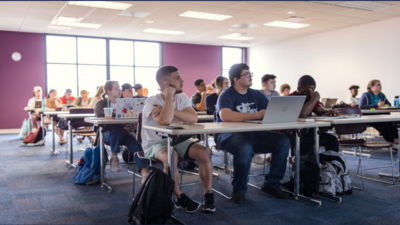What is Family Life Education?

Concordia University, Nebraska recently announced the launch of their new master’s degree program in family life education. This, along with their program in marriage and family therapy, is a service-focused, family and development-oriented, uniquely Christian degree offering that enables college graduates to pursue further education in a more specialized field with a focus on the family unit. If you find that you are motivated to know more about the function of family systems within society or care deeply about family values, chances are that a master’s degree in family life education may suit your skills and interests well.
Concordia’s family life education program is unique because upon completion of the prescribed course of study, its graduates will not only be eligible to apply for certification as a family life educator (CFLE) but will also possess skills in ministering to families from a Christian worldview in the congregational setting. Being able to meet families in the context of the church environment is a unique way to reach them where they are.
Family life educators emphasize the family as a unit affected by a complex system of influences; likewise, the functioning of the family unit impacts each individual member. During their education, they study topics like human growth and development, human sexuality, family dynamics, interpersonal relationships and parent education, among others. At Concordia, training of future FLEs consists of a blend of psychological theory and the Biblical principles that should guide their practice.
According to the National Council of Family Relations, the organization through which FLEs can gain certification, family life education empowers individual members of family systems to “develop knowledge and skills that enhance well-being and strengthen interpersonal relationships through an educational, preventive and strengths-based approach.” The organization believes that, with the development of these skills, families can function comfortably and optimally, improving the health of each member.
According to the family life education program at Concordia, marriage and the family are two central places which God uses to demonstrate His love. Being able to maintain healthy relationships between the members of these units means that each one will experience God’s love through their spouse and family. The connection that Concordia’s program has with Christian ministry mean that its family life education graduates will be specially equipped to serve families who are part of a church body and minister to them with the love and peace that only Christ can bring.
Family life education is very similar in its core tenets to another new graduate program at Concordia: marriage and family therapy. Both programs approach issues in individual functioning and mental health from a systems perspective and emphasize the role of the family unit in individuals’ well-being. However, family life educators also work with families who already function well. While they address societal issues and their impact on the family unit, they also focus on educating families in how to continue in the practices they’ve established over time and how to prevent issues from occurring.
Parenting and leading a family can be complicated and uncertain – and family life educators understand that! One role of these unique educators is to guide parents in developing healthy practices within their family and recognizing patterns that lead to conflict or struggle. Research in the field is a continuous process that may cause new insights into these patterns to occur; therefore, family life education is an exciting and dynamic field in which to take part.
Interested in getting a master's degree in family life education? Check out Concordia’s new program here.
Related Stories


